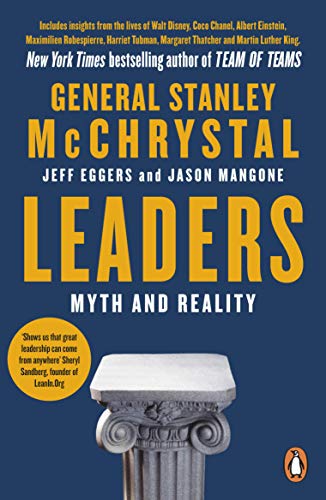


Leaders: Myth and Reality
E**A
A different perspective on leadership
This honest and humble perspective of leadership, explains that leadership is not formulaic. It doesn't prescribe any approach to leadership but it exposes in great detail how leadership looked from multiple perspectives. It starts slow but is difficult to put down. I found this book greatly enriching. Thank you Stanley.
M**N
Educational but hard to read
Hard to read
J**R
Satisfied customer
Christmas present
A**R
Timely and well-written
My dad is a big fan of books by military heroes. Safe to say his daughter (me) is not. Bu, after he finished reading I had a flick through and found this wasn't the standard description of military escapades and geo-strategy. It even has a chapter on Coco Chanel! Definitely not what I expected. I've now read about half of the pairings, each startlingly different and really insightful in terms of offering a novel perspectives on big name leaders.As an academic, some of the points made about leadership don't exactly seem rocket science. But actually there's a crispness and analytical precision which show that the authors really spent time developing sophisticated thinking, which they then condense down to make it a page-turner rather than academic tract. I think this is a really timely book when one marries the description of myths with many of the political crises we see emerging. Leadership is everything, but often we just need to return to first principles and ask why we see it as so. This book does that.So far, I'd particularly recommend turning to read about Walt Disney, Leonard Bernstein and Coco Chanel! I wish more of my dad's military books read like this.
W**N
thought provoking study of leadership
McChrystal has aimed to study leadership through writing with co-authors, a book that emulates Plutarch's Parallel Lives and looks at the myths of leadership he imbibed as a child from a now 90-year-old book of Greek myths. The book contains 'lives of leaders' from Walt Disney and Coco Chanel through Robespierre and Al-Zarquarwi, to Martin Luther and Martin Luther King. Then it contains reflections on leadership which draw also on McChrystal's own experience. He disarmingly relates in his prefatory material that when he came to write his own autobiography, he realised his own role in events as a leader had been less significant than he thought at the time, and the Great Man myth of leadership is one he looks to address.The lives themselves show how little there is in common between thought leadership (Alfred Einstein), military leadership (Robert E Lee) and political leadership ('power brokers' in the terminology of the book) such as Margaret Thatcher. Or indeed 'heroes' such as Harriet Tubman.Rather McChrystal tries to bring to life academic thinking about leadership, reflected in his final chapter, that sees leadership as an emergent property of specific contexts and leaders as symbolic representations of the hopes and fears of their followers. This is a dynamic system, and leaders may need training in story-telling and how to dress for the part, as well as to understand that there simply aren't 'off the shelf' solutions to individual problems. Sometimes, after heartsearching, Martin Luther King went to jail as part of a protest and sometimes he didn't. Always there were people he didn't please. Generally it worked out well. Churchill by contrast was always characteristised by the audacity of his thinking. Sometimes this worked out well and was what a situation called for. Sometimes it wasn't. But he was also always good a story telling...I didn't find the book all that compellingly well written; nor despite the best efforts of the authors did I find it a page-turner. But I did think it provided great scope for thought. The grounding of the leadership theory in the leadership lives makes what is otherwise quite dull (as well as counter-intuitive) thinking come alive; and gives it considerable credibility.
S**A
Interdisciplinary and inspiring
This was a truly interesting and inspiring book for many reasons. Not only due to the breadth of various leaders discussed (from Bernstein to military leaders to fashion designers) but also the nuanced interdisciplinary way in which this was done (looking at the problematic from an anthropological, psychological, political, and social perspectives), which is refreshing to say the least.The discussion of the notion of 'leadership' itself is something needed now more than ever, when traditional political lines are being blurred, and we are reconsidering what political tribalism and leadership actually looks like in the modern, globalised, and digitalised world.Highly recommend to anyone from any background to give a read.
D**T
Heavy Going
This is heavy going. I bought it as I admire McChrystal but this book is a disappointment. It seeks to put pairs of leaders from history together to compare and contrast styles, traits, strengths and weaknesses. It tends to end up as a series of small history lessons, not really teasing out the issues. I was close to giving up on it about halfway through but persevered. To be honest I was glad to reach the end.Not high on my recommendation lists for leadership reads.
K**N
Bit dissapointing
The pen-portraits of leaders are ok, but they are not particularly insightful. I expected a more thematic and scientific approach - psychology, anthropology, how charisma, ideas and tribalism works - to be combined with the narrative but its not there in any depth.
Trustpilot
1 day ago
2 months ago